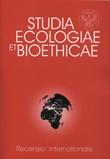Flora i fauna rezerwatu przyrody Jezioro Kiełpińskie i sąsiednich starorzeczy w strefie podmiejskiej Warszawy
Flora and fauna of the nature “Jezioro Kiełpińskie” reserve in Warsaw’s suburban zone, Poland
Author(s): Izabela Olejniczak, Marek Kloss, Anita Kaliszewicz, Paweł Boniecki, Jerzy RomanowskiSubject(s): Essay|Book Review |Scientific Life
Published by: Wydawnictwo Naukowe Uniwersytetu Kardynała Stefana Wyszyńskiego w Warszawie
Keywords: ecological corridor; Mazovia; protected species; freshwater species
Summary/Abstract: Field surveys for aquatic plants, invertebrates and vertebrates along the banks of Kiełpińskie Lake and sourrounding oxbows were conducted in June – August 2010. The study area is located in the Vistula River valley near Warsaw in central Poland. The results document the richness of flora and fauna species in the J. Kielpińskie reserve and adjacent aquatic habitats. A large number of protected species of plants and vertebrates was recorded in the area, including amphibians, birds and mammals that are of particular importance to the European community, such as the fire-bellied toad, little bittern, western marsh harrier, beaver and otter. Among aquatic plant communities, the community of "water lilies" Nupharo-Nymphaeetum was distinguished as the most valuable. The chain of oxbow lakes connected by a small stream forms an important ecological corridor. The presence of protected species and rare plant communities associated with the aquatic environment requires a responsible approach to the conservation of these habitats, located in close proximity to a large urban area. It also requires a holistic approach to nature protection in the reserve. In this case, not only should Kiełpińskie Lake be protected, but also its surroundings, which form elements of an ecological corridor.
Journal: Studia Ecologiae et Bioethicae
- Issue Year: 11/2013
- Issue No: 2
- Page Range: 89-112
- Page Count: 24
- Language: Polish

